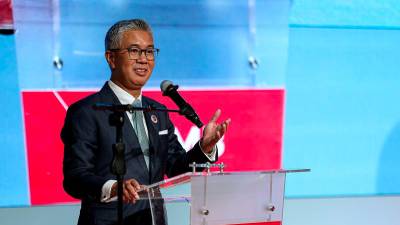KUALA LUMPUR: ASEAN remains proactive in diversifying and expanding its economic links and networks, given the ongoing global and regional economic uncertainties, said ASEAN Economic Ministers’ chair Tengku Datuk Seri Zafrul Abdul Aziz today.
Tengku Zafrul, also the Minister of Investment, Trade and Industry, said ASEAN Economic Ministers (AEM) look forward to further deepening the ASEAN-Gulf Cooperation Council (GCC) economic cooperation.
He described the annual AEM meet-up as an important platform for the bloc’s economic ministers to exchange views on the regional and global economic outlook.
“It is also an opportunity to discuss the progress of the Priority Economic Deliverables (PEDs) of the year, key initiatives under the ASEAN Economic Community, as well as ASEAN’s joint initiatives with our Dialogue Partners,” Tengku Zafrul told the closing press conference for the AEM Meeting and Related Meetings here today.
The minister highlighted that the upgraded version of the ASEAN Trade in Goods Agreement (ATIGA) marked a significant leap forward, designed to be more agile and responsive to both regional and global economic shifts.
The ASEAN Digital Economy Framework Agreement (DEFA) would drive the economic growth and social advancement towards an ASEAN-wide digital economy, he added.
He revealed that key themes dominating discussions in both internal ASEAN meetings and in consultations with ASEAN’s Dialogue Partners included the growing global trend of protectionism and the rise of unilateral trade measures, which pose significant risks to the multilateral rules-based trading system and the stability of global supply chains. “We underscored our shared commitment to uphold a free, fair, inclusive, rules-based, and non-discriminatory multilateral trading system, with World Trade Organisation (WTO) principles at its core,” Tengku Zafrul said.
He noted that ASEAN Economic Ministers also acknowledged the ASEAN Geoeconomics Task Force’s (AGTF) recommendations on new approaches and strategies to advance ASEAN integration amidst increasing geoeconomic fragmentation. He said this was key to ensuring a coordinated ASEAN strategy for adapting to the evolving global geoeconomic and geopolitical landscape.
He added that the AEM discussed and welcomed the good progress of the implementation of the 18 PEDs of Malaysia’s ASEAN chairmanship this year, in particular the nine PEDs under the direct purview of the AEM, including the endorsement of the ASEAN Framework for Integrated Semiconductor Supply-Chain (AFISS).
Separately, ASEAN Secretary-General Dr Kao Kim Hourn highlighted the ATIGA agreement as an important priority economic deliverable of Malaysia’s ASEAN chairmanship this year. He noted that the AEM had reaffirmed its commitment to sign the ATIGA agreement at the sidelines of the 47th ASEAN Summit in October.
“The upgraded ATIGA represents a significant milestone in ASEAN’s trade agenda, not only in boosting interest in trade and investment, but also in consolidating ASEAN as a single market and production base,” Kao said.
He noted that the upgraded ATIGA incorporated new elements to address emerging issues. These include re-manufactured goods, trade and humanitarian crises, supply chain connectivity, and a new alternative distribution resolution mechanism to enhance the resilience and future growth of the region’s trade ecosystem. – BERNAMA
